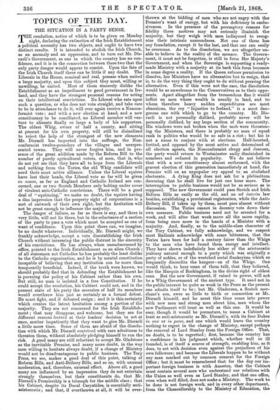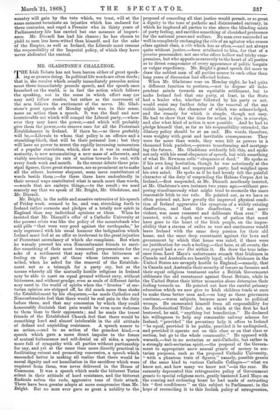TOPICS OF THE DAY.
THE SITUATION IN A PARTY SENSE.
THE resolution, notice of which is to be given on Monday night, declaring the extinction of the Irish Establishment a political necessity has two objects, and ought to have two distinct results. It is intended to abolish the Irish Church, as an anomaly and an oppression, and to turn out Mr. Dis- raeli's Government, as one in which the country has no con- fidence, and it is in the connection between these two that the only party danger would appear to consist. Upon the fate of the Irish Church itself there can be little if any doubt. The Liberals in the House, nominal and real, possess when united a large majority, and upon this subject they must, willing or unwilling, be united. Most of them sincerely dislike the Establishment as an impediment to good government in Ire- land, and they have the strongest personal reasons for acting on their intellectual convictions. No Liberal who rats upon such a question, or who does not vote straight, and take care to be in attendance to do it, will ever again receive a Noncon- formist vote ; and with a new election at hand, and a new constituency to be conciliated, no Liberal member will ven- ture to alienate finally so large a body of his supporters. The oldest Whig, owner of half a county, and sitting at present for his own property, will still be disinclined to reject the help of the strongest of the new elements Mr. Disraeli has imported into the suffrage, the Non- conformist twelve-pounders of the villages and unrepre- sented towns. They will never forgive him, and in pre- sence of the great addition made by the Reform Bill to the number of purely agricultural voters, of men, that is, who do not yet see that they have all to hope from the Liberals and nothing from the Tories, the old Whig candidate will need their most active alliance. Unless the Liberal squires have lost their heads, the Liberal vote so far will be given en masse, as far as England and Catholic Ireland are con- cerned, one or two Scotch Members only bolting under cover of virulent anti-Catholic convictions. There will be a good deal of " squirming," we make no doubt, the squires having a dim impression that the property right of corporations is a sort of outwork of their own right, but the hesitation will not be great enough to influence the majority.
The danger of failure, so far as there is any, and there is very little, will not lie there, but in the reluctance of a section of the party to pass a vote which must be accepted as one of want of confidence. Upon this point there can, we imagine, be no doubt whatever. Individually, Mr. Disraeli might, we frankly acknowledge, accept a vote disestablishing the Irish Church without increasing the public distrust in the sincerity of his convictions. He has always, when unembarrassed by office, pointed to the Irish Establishment as an alien Church ; of all statesmen not Catholics he has probably the least dislike to the Catholic organization, and he is by mental constitution incapable of believing that any institution can be more than temporarily beneficial. Indeed, if the truth were known, we should probably find that in defending the Establishment he is pursuing the policy of his Cabinet rather than his own. But still, no man is isolated in a free Constitution. If he could accept the resolution, his Cabinet could not, and in the present state of his party the secession of half its members would overthrow him just as certainly as a formal defeat. He must fight, and if defeated resign ; and it is this certainty which creates the latent hesitation among a portion of the majority. They are not concerned for the Irish Establish- ment ; that may disappear, and welcome, but they are for different reasons fretted at their leaders' decision to act at once, mutter impatiently that they want to give Mr. Disraeli a little more time. Some of them are afraid of the dissolu- tion with which Mr. Disraeli contrived with rare adroitness to threaten them, without absolutely pledging himself to run the risk. A good many are still reluctant to accept Mr. Gladstone as the inevitable Premier, and many more doubt, in the way men willing to hesitate always doubt, if a change of Ministry would not be disadvantageous to public business. The Tory Press, we see, makes a good deal of this point, talking of Reform Bills, and Anti-Bribery Bills, and so on, with unusual moderation, and, therefore, unusual effect. Above all, a good many are influenced by an impression they do not entertain strongly themselves, but their constituents do, that Mr. Disraeli's Premiership is a triumph for the middle class ; that his Cabinet, despite its Ducal Caryatides, is essentially anti- aristocratic ; and that, if overthrown at all, it will be over- thrown at the bidding of men who are not angry with the Premier's want of energy, but with his deficiency in exclu- siveness. In the presence of the peremptory reasons for fidelity these motives may not seriously diminish the majority, but they weigh with men indisposed to recog- nize their intrinsic unsoundness. Not one of them has any foundation, except it be the last, and that one can easily. be overcome. As to the dissolution, we are altogether un- able to believe in the reality of the menace. The Govern- ment, it must not be forgotten, is still in form Her Majesty's. Government, and when the Sovereign is supporting a ready- made Ministry with a majority at its back this form becomes in some degree a reality. If the Queen refuses permission to dissolve, her Ministers have no alternative but to resign, that is, to do the very thing they ought to do without pressing the alternative. Even if this were not the case, the dissolution, would be as unwelcome to the Conservatives as to their oppo- nents. Apart altogether from the tremendous fine it would inflict on men whose wealth is usually in land, and to, whom therefore heavy sudden expenditures are most obnoxious, the cry " Injustice to Ireland," is a most dan- gerous one with which to go to the country. Mr. Dis- raeli is not personally disliked, probably never will be- personally disliked, by any large section of the community.. His windows were not broken when the mob were threaten- ing the Ministers, and there is probably no man of equal rank in politics who would be so safe in a riot ; but his is. not a name to conjure with at elections. Half-hearted, fretted, and opposed by the most active and determined of all election agents, the Nonconformist clergy and deacons,. the party would return to Westminster sadly diminished in numbers and reduced in popularity. We do not believe- that with a new constituency almost enthroned, with the gravest election of this generation immediately at hand, the Premier will on an unpopular cry appeal to an abolished: electorate. A dying King does not ask for 'a plebiscitum decreeing that he shall live for just one hour more. The• interruption to public business would not be so serious as is supposed. The new Government could pass Scotch and Irish, Reform Bills as easily as the old, and an ad interim law- besides, establishing a provisional registration, while the Anti- Bribery Bill, if taken up by them, must pass almost without discussion. The Tories cannot in decency vote down their- own measure. Public business need not be arrested for a, week, and will after that week move all the more rapidly, from being once more in the hands of a Minister with a.. majority. And, finally, as to the middle-class character of the Tory Cabinet, we fully acknowledge, and we suspect most Radicals acknowledge with some bitterness, that the Tories have been for half a century fairer than the Whigs. to the men who have found them energy and intellect. They have shown indefinitely less either of the aristocratic jealousy natural enough to a party which was originally Es. party of nobles, or of the wretched social flunkeyisra which so frequently discredits the hangers - on of the Whigs. One would think, to hear some of them talk, that they believed, like the Marquis of Rockingham, in the divine right of eldest sons. But the new Government, if raised to power, will not be a Whig Government of the ancient type. It need not its the public interest be quite as weak in the Peers as the present one admits itself to be ; but Mr. Gladstone, a Scotch mer- chant's son, owes as little to birth or connection as Mr. Disraeli himself, and he must this time come into power with new men and strong men about him, men whom the new Parliament will trust as well as this one. It would be easy, though it would be premature, to name a Cabinet at least as anti-aristocratic as Mr. Disraeli's, with its four Dukes in esse or in posse, and one which would leave the country nothing to regret in the change of Ministry, except perhaps the removal of Lord Stanley from the Foreign Office. That, no doubt, is to be regretted ; first, because the country has a confidence in his judgment which, whether well or ill founded, is of itself a source of strength, enabling him, as it does, to act with decision even against the prejudices of his own followers; and because the Liberals happen to be without any man marked out by common consent for the Foreign Office ; but it must be remembered that for the day our im- portant foreign business is with America, that the Cabinet must contain several men who understand our relations with the Union as well even as Lord Stanley, and that one office, even when well filled, does not make a Ministry. The work to be done is not foreign work, and in every other department, from the Chancellorship to the Ministry of Education, the
country will gain by the vote which, we trust, will at the same moment terminate an injustice which has endured for three centuries, and expel a Premier who in thirty years of Parliamentary life has carried but one measure of import- ance. Mr. Disraeli has had his chance ; he has chosen to yield to men less keen-witted than himself, and for the sake of the Empire, as well as Ireland, the Liberals must resume the responsibility of the Imperial policy, of which they have never abdicated the control.































 Previous page
Previous page